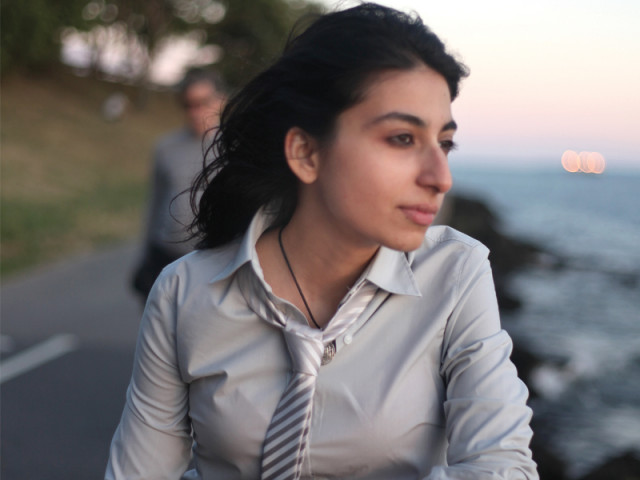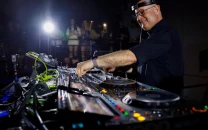Finding Rumi in Rockwood Hall
With her lilting soft voice, slowly unfolding melodies, Arooj Aftab already has following among discerning listeners.

It’s a Sunday evening but the pavements are still sunlit as friends, fans and first timers pack into the Rockwood Music Hall, an intimate performance venue located in the Lower East Side neighbourhood of Manhattan. They’re all here to listen to Arooj Aftab sing traditional South Asian music.
With her lilting soft voice and slowly unfolding melodies, 27-year-old Arooj already has a following among discerning listeners, but her mass popularity is also increasing day by day as news of her music spreads by word of mouth. While she’s by no means a household name just yet, Arooj is doing more and more live performances and earlier this year she played to a packed auditorium at the Asia Society Foundation in New York alongside Arif Lohar.
Along with artists like Quratulain Balouch, Meesha Shafi and Zeb and Haniya, Arooj is part of the recent current crop of young Pakistani female musical artists who have made a name for themselves. Arooj grew up in Lahore but left for the US at the age of 20 to pursue a degree in music engineering from the Berklee College of Music in Boston, one of the largest independent colleges of contemporary music in the world.
Arooj’s love affair with music began early, and she spent endless weekends of her childhood singing with her family, who were not professional vocalists but shared a love for singing. While her older brother was always considered to have the best voice in the family, it was Arooj who chose music as a career. Although she never has trained with a bonafide Ustaad, Arooj spent time studying classical music with Sara Zaman, a little known but highly respected traditional singer from her hometown of Lahore.
At Rockwood Music Hall that evening, the first song is “Man Kunto Maula”. Arooj is dressed in a black velvet sherwani with a gold thread motif over a dark tank top and jeans and, along with her kajal lined eyes, she is the very picture of her musical style. There are no vocal fireworks or unnecessary embellishment as Arooj fuses elements of eastern classical poetry with western technique to present an honest and spiritual form of music that is both deep and conversational.
A tribute to the late Mehdi Hassan is next and then she sings an improvised version of “Mohabat Karne Walay” before launching into her own songs. “Udhero na” a melancholic song from her upcoming eponymous debut album is next. But it is Rumi’s poetry which, despite her warning that the song is still “a work in progress”, proves to be both haunting and uplifting. The prose seamlessly blends with the beautiful music provided by guitarist Brighu Sahni, a band member and fellow collaborator of 4 years. The evening is brief and the performance ends within the hour after she sings two more numbers.
As the crowd of people mill about afterwards, I walk over to Arooj to ask her about her upcoming album. “We are trying to redefine and reinterpret world music and pre-partition South Asian music,” she says about her style of music. “Sufism ko bhee hum aage daal rahe hain and we’re promoting ambient minimalist music. We are stripping it down. We are doing pahari, khayal, ghazal and thumri and re-composing and re-harmonising all this ancient music and poetry, creating a neo-sufi genre, a new age deeply intricate class of fusion world music.”
Aftab has come a long way from her first ever performance in Lahore, where she recalls singing cover songs as the opening act for a Strings concerts at Kinnaird College. The two thousand plus crowd had been fun, but the focus was elsewhere. Arooj has her own following now, but that doesn’t mean that her sound is, by any stretch of the imagination, mainstream. I ask her about the response her music has received so far. “I think that people are really interested in being relaxed and having a vision of peace and love. They want to listen to good world music,” she says, speaking the way she sings, with English sentences following Urdu ones. “And I feel like New York is the best place for this kind of music because, yahan pe diversity itnee zyada hai and openness itnee zyada hai, you know people have loved it — it’s been amazing thank God.”
Most of the crowd I speak to seem to agree. I was particularly interested in finding out the impressions of people who were not familiar with Urdu. Lehna Huie, a native New Yorker, has come with a friend and was listening to Arooj sing live for the first time. I asked her what she thought of the songs with Urdu lyrics. “I felt like I was still able to understand it on some level,” she said. “That was my reaction to the mellowness of her voice. I felt it in my heart, so I really enjoyed it.”
A woman visiting from Karachi said she had heard Arooj for the first time at a performance in Boston. “I was crying,” she says. “It was an experience.” As I made my way out onto the busy pavement, I couldn’t help but agree.
Published in The Express Tribune, Sunday Magazine, July 22nd, 2012.



















COMMENTS
Comments are moderated and generally will be posted if they are on-topic and not abusive.
For more information, please see our Comments FAQ